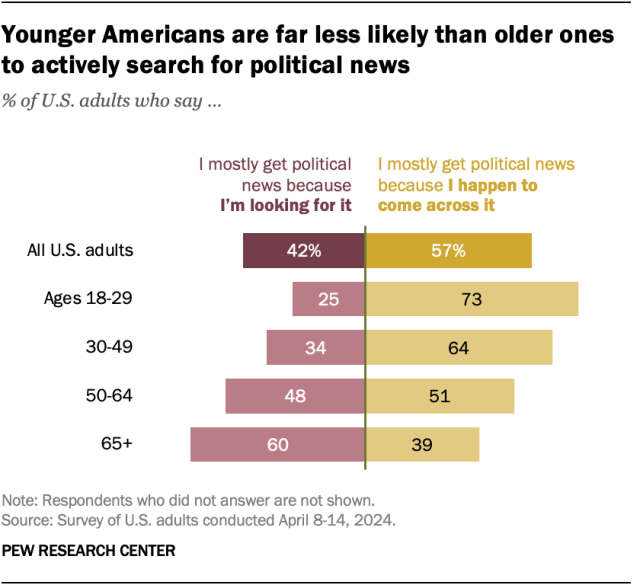☀️ Happy Thursday! The Briefing is your guide to the world of news and information. Sign up here!
In today’s email:
- Featured story: How Google’s use of AI in search results will affect publishers
- In other news: Israel-funded influence campaign targeted U.S. lawmakers for support in Gaza war
- Looking ahead: News Corp executive says Australia should force Meta to pay news companies for content on Facebook
- Chart of the week: How Americans come across political news
🔥 Featured story
The ongoing rollout of artificial intelligence in everyday technology continues to prompt discussion about the implications of AI for news producers. One specific concern for publishers is whether Google’s use of AI in search results will reduce valuable web traffic to their sites from Google.
Search engines have become a common pathway to news for Americans. Roughly seven-in-ten U.S. adults said in a 2023 Center survey that they often (27%) or sometimes (44%) get news from search, up from six-in-ten the year before. And 15% say this is their preferred way of getting news.
📌 In other news
- Israel-funded influence campaign targeted U.S. lawmakers for support in Gaza war
- Columbia law journal website taken offline after article accusing Israel of crimes against humanity
- Sally Buzbee out as Washington Post editor amid newsroom restructuring
- Political consultant fined $6 million for deepfaking Biden’s voice
- Epoch Times executive faces accusations of money laundering
- NewsBreak reportedly used AI to write inaccurate local U.S. stories
- CNN tests adding a registration wall
📅 Looking ahead
A senior News Corp Australia executive said this week that the Australian government should force Meta to pay Australian news publishers for the news content that is shared on Facebook, and should impose more regulations on social media firms in general.
In the U.S., three-in-ten adults say they regularly get news on Facebook, according to a 2023 Center survey – higher than the share who get news on any other social media site. Meanwhile, Meta has pulled in more than a third of all digital display advertising revenue in the U.S. each year since 2016.
📊 Chart of the week
Our chart this week highlights how Americans engage with political news.
Americans are more likely to say they mostly get political news because they happen to come across it than because they are looking for it (57% vs. 42%), according to our recent survey.
There are striking differences by age: Just a quarter of Americans ages 18 to 29 say they mostly get political news because they are looking for it, compared with 60% of those 65 and older – a gap of 35 percentage points.
👋 That’s all for this week.
The Briefing is compiled by Pew Research Center staff, including Naomi Forman-Katz, Jacob Liedke, Sarah Naseer, Christopher St. Aubin, Luxuan Wang and Emily Tomasik. It is edited by Katerina Eva Matsa, Michael Lipka and Mark Jurkowitz, and copy edited by Rebecca Leppert.
Do you like this newsletter? Email us at journalism@pewresearch.org or fill out this two-question survey to tell us what you think.
